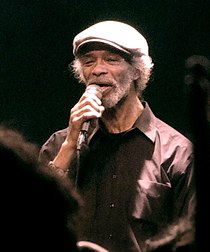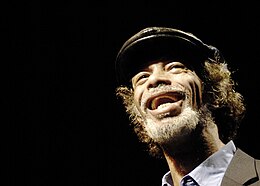Gil Scott-Heron

|
||||||||||||||||||||||||||||||||||||||||||||||||||||||||||||
| Gil Scott-Heron, 2010 | ||||||||||||||||||||||||||||||||||||||||||||||||||||||||||||
|
Chart positions Explanation of the data |
||||||||||||||||||||||||||||||||||||||||||||||||||||||||||||
| Albums | ||||||||||||||||||||||||||||||||||||||||||||||||||||||||||||
|
||||||||||||||||||||||||||||||||||||||||||||||||||||||||||||
| Singles | ||||||||||||||||||||||||||||||||||||||||||||||||||||||||||||
|
||||||||||||||||||||||||||||||||||||||||||||||||||||||||||||
Gil Scott-Heron (born April 1, 1949 in Chicago , Illinois , † May 27, 2011 in New York ) was an American musician and poet .
Scott-Heron's music combines elements from funk , jazz , soul and Latin American music . He often worked with spoken word in his pieces and is therefore considered one of the most important pioneers of hip-hop and rap music. His texts are mostly shaped by political or social content.
His best-known pieces include The Revolution Will Not Be Televised , The Bottle , Johannesburg , Angel Dust and Lady Day and John Coltrane.
Life
Childhood and youth
His father Gil Heron (1922–2008) taught him to play the piano and read at an early age. This was the first black football player at Celtic Glasgow . His parents soon separated, and Scott-Heron grew up with his grandmother in the state of Tennessee . Here he got to know the rural African American culture and way of life of the southern states , but also a strong racism . He was one of three non-white children for the purpose of integration into a white elementary school in Jackson were sent.
Since he could no longer bear this pressure, he moved in with his mother, a librarian who now lived in the Bronx, New York. There he went to high school, where he got to know the work of the Harlem Renaissance poet Langston Hughes and LeRoi Jones (later Amiri Baraka) , who was influenced by the beat poets and the Afro-American civil rights movement . These should strongly shape his way of writing, both in terms of content and style. He later moved with his mother to a Latin American neighborhood in New York's Chelsea neighborhood.
Scott-Heron was accepted into Lincoln College in Oxford, Pennsylvania . Here he met Brian Jackson, with whom he later worked for many years. According to his own statements, however , he was busy working on his first novel, The Vulture , and left college after a year. He also briefly attended Johns Hopkins University in Baltimore . In 1970 he published his debut novel, which was widely recognized.
Beginning of the musical career
Through the good reviews of his debut novel, Scott-Heron got to know the jazz producer Bob Thiele , who had already worked with legends such as Louis Armstrong and John Coltrane . This enabled him in 1970 to write his first album Small Talk at 125th & Lenox Ave. on which he recited socially critical texts from his poetry book of the same name. He combined them with conga rhythms and other percussive elements. For the soundtrack to Scott-Heron's lyrics, Thiele was able to bring together some renowned jazz musicians such as Ron Carter (bass), Eddie Knowles and Charlie Saunders (percussion). The debut included one of Scott-Heron's strongest pieces to date, the media and capitalism-critical song The Revolution Will Not Be Televised .
In 1971 he released the album Pieces of a Man . Here he oriented himself more towards straightforward, soulful song structures on some tracks such as the title track and Lady Day and John Coltrane . The following year he published his second novel, The Nigger Factory , and his third album Free Will . This should be his last for the Flying Dutchman label, with whom he fell out. The next album, Winter in America , he recorded for Strata East .
Commercial win
In 1975 he was hired by Clive Davis as the first artist for the new label Arista Records , where he stayed for ten years. Here, more attention was paid to getting songs into the charts, which was achieved with the singles Johannesburg (1975; No. 29 on the R&B charts) and The Bottle (1978; No. 15 on the R&B charts). However, he didn't stand a chance in the pop charts. In 1978 his long-time colleague Jackson left him, who had made his first two records for Arista, First Minute of a New Day and From South Africa to South Carolina , musically and practically directed Scott Heron's Midnight Band.
In 1978 the producer Malcolm Cecil Scott-Herons took on music. In the early 1970s, the heyday of funk, he worked with the Isley Brothers and Stevie Wonder , among others . Now he was partly responsible for Scott-Heron's biggest hit, The Bottle , which was about alcohol abuse. In the 1980s, Scott-Heron worked with producers such as Nile Rodgers and Bill Laswell . In 1985 he was fired from his record company Arista after the release of a Best Of album.
Withdrawal and cult star status
He withdrew from the music business, but continued touring the world, where he was celebrated again as part of the retro music wave , but also by rap and hip-hop fans. In 1993 he signed another contract with TVT Records and released the highly acclaimed album Spirits (1994), which included the track Message to the Messengers , in which he called on young rappers to take responsibility for their art and the community take over.
In 1994 he appeared in a "Spoken Word" special from MTV .
His last book, Now & Then (2001), was published by his own publisher, Brouhaha Books. In 2001 he was jailed for one year for possession of one gram of cocaine . After he was released in October 2002, he worked again with colleague Brian Jackson, among others. In 2003 Don Letts filmed a documentary about Scott-Heron's life on behalf of the BBC. That same year, Scott-Heron was sent to prison again for possession of illegal drugs, from which he was released a year later. In December 2005, he was arrested again in New York for drug possession. Scott-Heron's longstanding cocaine addiction is the subject of much controversy.
On February 8, 2010, I'm New Here, his first album since 1994, was released. In February 2011, the London-based producer Jamie xx released a remix version of the album under the title We're New Here .
Gil Scott-Heron died in May 2011 at the age of 62 from complications from AIDS.
politics
In his songs, Scott-Heron primarily dealt with the social realities of African Americans and the social situation in the USA. He sympathized with the civil rights movement of the 1960s. From 1975 he turned to the problems of the “ Third World ” in his texts , for example South Africa . In the early 1980s he sharply opposed the politics of Ronald Reagan , explicitly in songs like B-Movie and Re-Ron . From the beginning he also wrote about society's problems with drugs.
Discography
Studio albums
- 1970: Small Talk at 125th & Lenox Ave (1970; Flying Dutchman Records)
- 1971: Pieces of a Man (Flying Dutchman Records)
- 1972: Free Will (Flying Dutchman Records)
- 1974: Winter in America ( Strata-East Records )
- 1975: The First Minute of a New Day - The Midnight Band (Arista Records)
- 1976: From South Africa to South Carolina (Arista Records)
- 1976: It's Your World (Arista Records) (partly live)
- 1977: Bridges (Arista Records)
- 1978: Secrets (Arista Records)
- 1980: 1980 (Arista Records)
- 1980: Real Eyes (Arista Records)
- 1981: Reflections (Arista Records)
- 1982: Moving Target (Arista Records)
- 1994: Spirits (TVT Records)
- 2010: I'm New Here (XL Recordings)
- 2020: We're New Again - A Reimagining by Makaya McCraven
Guest appearances / features
- 1996: Ron Holloway - Scorcher (Title: Is That Jazz ?, Blue Collar )
- 2000: Talib Kweli & Hi-Tek - Train Of Thought (Title: The Blast )
- 2009: Malik & the OG's - Rhythms of the Diaspora (Title: Black and Blue )
Live albums
- 1990: Tales of Gil Scott-Heron and His Amnesia Express (Arista Records)
- 1994: Minister of Information (Peak Top Records)
- 2004: Save the Children - Live in Concert (Delta Music)
Compilations
- 1974: The Revolution Will Not Be Televised (Flying Dutchman Records)
- 1979: The Mind of Gil Scott-Heron (Arista Records)
- 1984: The Best of Gil Scott-Heron (Arista Records)
- 1990: Glory - The Gil Scott-Heron Collection (Arista Records)
- 1998: The Gil Scott-Heron Collection Sampler: 1974–1975 (TVT Records)
- 1998: Ghetto Style (Camden Records, UK:
 silver)
silver) - 1999: Evolution and Flashback: The Very Best of Gil Scott-Heron ( RCA )
- 2005: Gil Scott-Heron & Brian Jackson - Messages
Book publications
- 1970: Small Talk at 125th and Lenox: a Collection of Black Poems. World Publishing Co., New York.
- 1970: The Vulture. World Publishing Co., New York, ISBN 0-86241-528-4 .
- 1972: The Nigger Factory. Dial Press, New York, ISBN 0-86241-527-6 .
- 1990: So Far, So Good. Third World Press, Chicago, ISBN 0-88378-133-6 .
- 2001: Now and Then: The Poems of Gil Scott-Heron. Canongate Publishing Ltd., Edinburgh, ISBN 0-86241-900-X .
- 2012: The Last Holiday: A Memoir (posthumous: Autobiography), Canongate Books, Edinburgh 2012, ISBN 978-0-85786-301-0 . ( Reviewed in: The Guardian, Feb. 5, 2012 )
Films with and about Gil Scott-Heron
- 1982: Black Wax. Live video and DVD with a concert recording by Robert Mugge, recorded in Washington DC in 1982
- 1991: Gil Scott-Heron and his Amnesia Express - Tales of Gil. Concert recording and interview with Kevin Le Gendre
- 1988: Freedom Beat. The Video Image Entertainment
- 1979: No Nukes. Production: CBS, Fox Video
- 1989: Jazz Shorts. Production: Rhapsody Films Inc.
- 2003: The Revolution Will Not Be Televised. TV documentary, Great Britain, director: Don Letts, production: BBC , BBC film site .
- 2007: Gil Scott-Heron & Amnesia Express - The Paris Concert. Recorded live at the New Morning - Paris - July 23rd 2001, DVD, 120 min.
swell
- ↑ Chart sources: DE CH UK US
- ↑ Music Sales Awards: UK
- ↑ "Gil Scott-Heron, Voice of Black protest Culture, this at 62" , AP / New York Times , May 28, 2011
- ↑ see John Coltrane
- ↑ Roddy Forsyth: "Celtic's first black player Gil Heron, this" , Daily Telegraph , November 30th 2008, Obituary
- ↑ Soul poet Gil Scott-Heron - Look who's grumbling! , Spiegel Online , February 7, 2010
- ↑ Gil Scott-Heron in the Notable Names Database (English)
- ↑ The return of the spoken word hero Gil Scott-Heron ( Memento of the original from February 14, 2010 in the Internet Archive ) Info: The archive link was inserted automatically and has not yet been checked. Please check the original and archive link according to the instructions and then remove this notice.
- ↑ Meeting (Musikexpress)
Web links
- Works by and about Gil Scott-Heron in the catalog of the German National Library
- Gil Scott-Heron in the Internet Movie Database (English)
- Official site of Scott-Heron
- Christian Broecking : "You take the kids too seriously" , the daily newspaper , November 18, 2005
- On the death of Gil Scott-Heron: Bob Dylan's black brother , Spiegel Online, May 28, 2011
- On the death of Gil Scott-Heron , Faz.net, May 28, 2011
- I am the original The Return of the Poet Gil Scott-Heron (broadcast manuscript) (PDF; 157 kB)
| personal data | |
|---|---|
| SURNAME | Scott-Heron, Gil |
| BRIEF DESCRIPTION | American musician and poet |
| DATE OF BIRTH | April 1, 1949 |
| PLACE OF BIRTH | Chicago , Illinois , USA |
| DATE OF DEATH | May 27, 2011 |
| Place of death | New York , USA |
